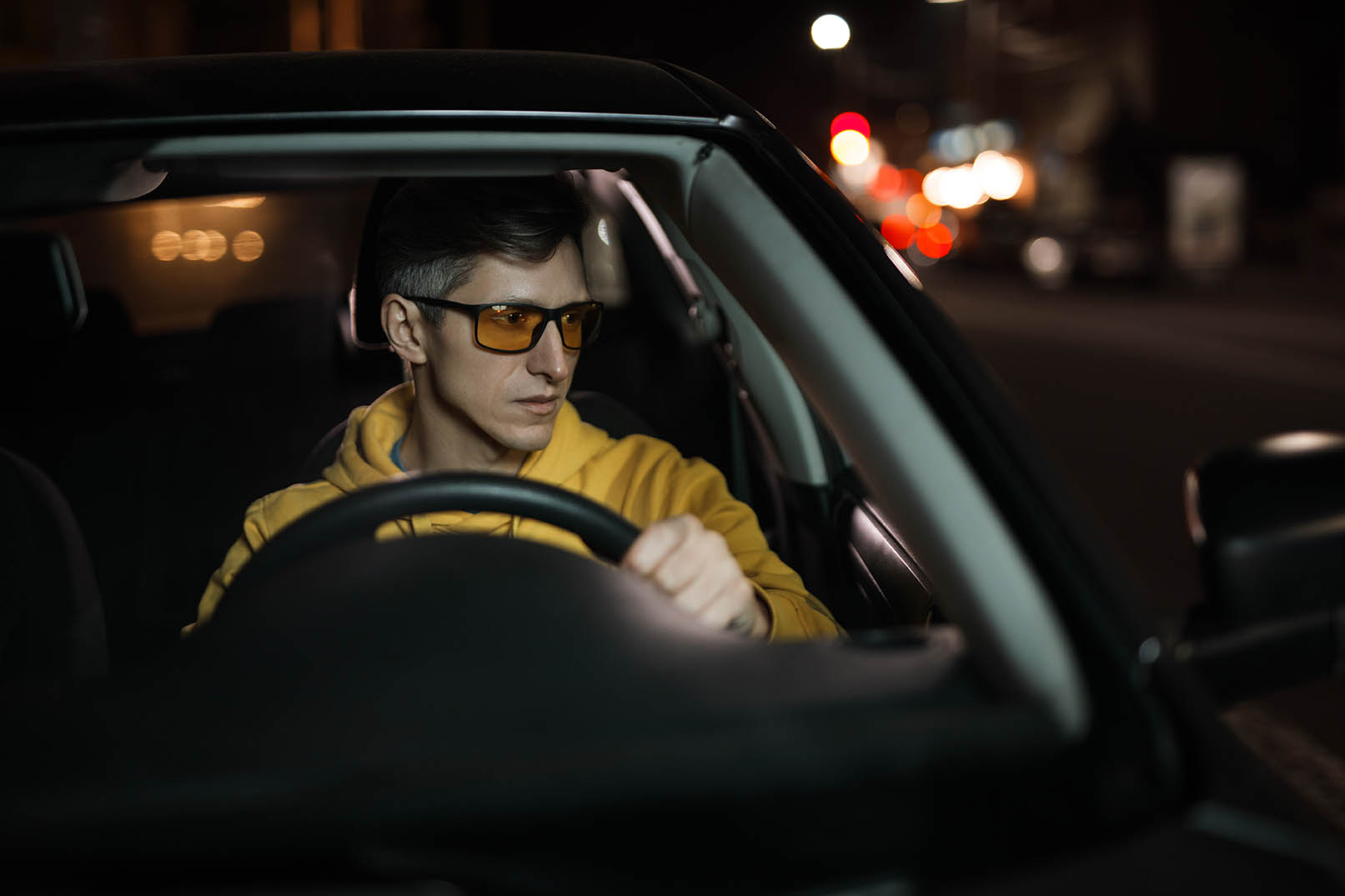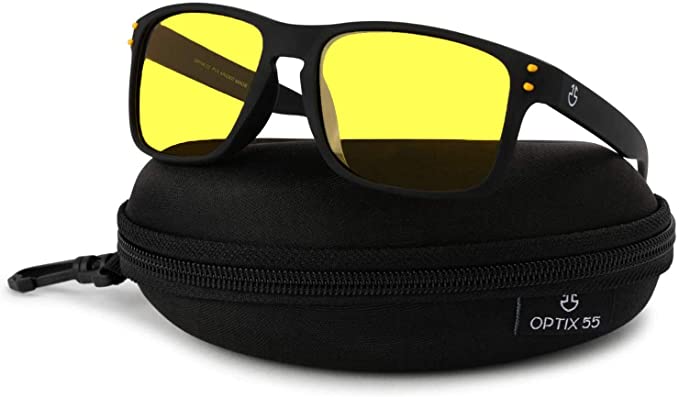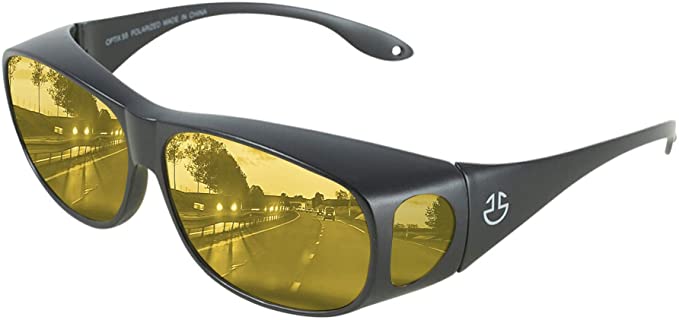Yellow “Night-Driving” Glasses: Do They Really Work?
Last Updated on

For a long time, glasses were the most practical and affordable way to correct problems with vision. Before contacts, they were essentially the only way for a person with poor vision to see clearly. Today, glasses come in many different varieties, created to correct specific vision issues, such as near-sightedness, far-sightedness, and even specialty lenses that block only particular types of light.
Night driving glasses aren’t new. They’ve been around for quite a few years, and several different versions have been released. Two of the most common types are designed to work with specific frequencies of light. Blue light glasses are designed to block the blue light emitted from the screens of our technological devices. Glasses with yellow lenses are meant to provide higher levels of contrast, which, in turn, is supposed to aid with night driving. But do these yellow glasses actually make it easier to see when driving at night? Let’s find out.

What Are Yellow Night-Driving Glasses Supposed to Do?
If you’ve ever been around shooting sports, you’ve almost certainly seen glasses with yellow lenses being used. These are designed first and foremost to protect the shooter’s eyes against small pieces of shrapnel. But they also have a secondary purpose, which is to increase contrast, allowing the shooter to more easily pick out their target against a background. Finally, these yellow lenses also help to reduce glare, which can be extremely important during bright daylight conditions.
The idea behind yellow lenses for night driving is that the increased contrast makes it easier to see at night. Furthermore, the glare-blocking effect of yellow lenses is supposed to reduce the reflections that you see from headlights, streetlights, and other light sources at night.

How Do Yellow Glasses Work?
The yellow tint in these “night-driving” glasses works by blocking out particular frequencies of light. In this case, they’re blocking out blue light, which is the portion of the visible light spectrum that contains the shortest wavelengths with the highest energy. This blue light is the light that’s most likely to cause a glare for human eyes, so the yellow lenses make a lot of sense for daylight use. However, blocking out any of your visible light during night driving might not be the best idea.
A Study on Yellow Night-Driving Glasses
Luckily, researchers have done some extensive testing to shed light on the effects of yellow lenses at night. What they found might surprise you.
According to the study, response times when using yellow lenses did not improve over clear lenses, no matter what conditions they were testing in. In fact, they found that wearing yellow lens glasses can even impede your ability to detect pedestrians at night, though not in a statistically significant manner.
In the end, the study’s authors determined: “These findings do not appear to support having eye care professionals advise patients to use yellow-lens night driving glasses.”

Do Yellow Night-Driving Glasses Actually Help?
In 1997, the Federal Trade Commission (FTC) prohibited making claims about yellow lens glasses improving night driving safety. They cited insufficient supporting evidence as the main reason. So, we’ve known since the 90s that these glasses had no proven improvement on night driving or nighttime vision.
Of course, things can change over time, and they often do. But not in this case. The study we just discussed took place in 2019, showing that more than 20 years later, there’s no proof of yellow lens glasses aiding in night driving. Worse, they can even decrease your ability to see at night since they’re blocking out part of the visible light spectrum.
Why is Your Night Vision Getting Worse?
If you were hopeful that yellow lens night-driving glasses were going to be your solution to failing nighttime vision, then you probably have another underlying issue. So, what could be causing your nighttime vision to get worse?
One of the most common culprits is a condition known as macular degeneration. This condition alters the amount of time that the light receptors in your eyes take to regenerate. You might notice that it takes longer for your eyes to adjust after walking from a brightly lit room into a dark one. This is due to macular degeneration, and it will continue to get worse with time.
Macular degeneration isn’t the only condition that can affect your nighttime vision though. Other conditions that can decrease your ability to see at night include cataracts, diabetes, glaucoma, and more.
What to do About Poor Night Vision
Since yellow lens glasses won’t help your nighttime vision, what should you do? Well, you need to see an Ophthalmologist. They can diagnose any underlying conditions that could be decreasing your ability to see at night. But if they suggest yellow lens glasses for night driving, turn and run to a more qualified expert!
Many of these underlying vision conditions are affected by your nutrition. Eating properly and taking some health-boosting supplements can often counteract your loss of nighttime vision. For instance, supplementing with carotenoids can help to improve your vision. Many eye doctors even carry such supplements in their offices. But you don’t have to take supplements to get more carotenoids. You can simply eat healthy fruits and vegetables such as carrots, tomatoes, red and orange peppers, spinach, and kale; all of which are known to contain high amounts of carotenoids.

Conclusion
We like to think that snake oil salesmen are long gone, but the truth is, there’s snake oil to be bought in every industry. Unfortunately, many people fall for marketing and advertising scams that are designed to capitalize on your fears and desires. You want to see better when driving at night and you’re afraid of what could happen if your nighttime vision gets worse. Yellow lens “night-driving” glasses seem like a simple and easy solution. Sometimes, the old adage “nothing worth having comes easy” holds true. It would be nice if slapping on a pair of glasses with yellow lenses could solve your nighttime vision problems, but according to science, it’s just not that simple.
- You may also be interested in: Shooting Glasses Lens Color Guide
Featured Image Credit: AntGor, Shutterstock
About the Author Dean Eby
An avid outdoorsman, Dean spends much of his time adventuring through the diverse terrain of the southwest United States with his closest companion, his dog, Gohan. He gains experience on a full-time journey of exploration. For Dean, few passions lie closer to his heart than learning. An apt researcher and reader, he loves to investigate interesting topics such as history, economics, relationships, pets, politics, and more.
Related Articles:
How to Clean a Refractor Telescope: Step-by-Step Guide
How to Clean a Telescope Eyepiece: Step-by-Step Guide
How to Clean a Rifle Scope: 8 Expert Tips
Monocular vs Telescope: Differences Explained (With Pictures)
What Is a Monocular Used For? 8 Common Functions
How to Clean a Telescope Mirror: 8 Expert Tips
Brightfield vs Phase Contrast Microscopy: The Differences Explained
SkyCamHD Drone Review: Pros, Cons, FAQ, & Verdict
